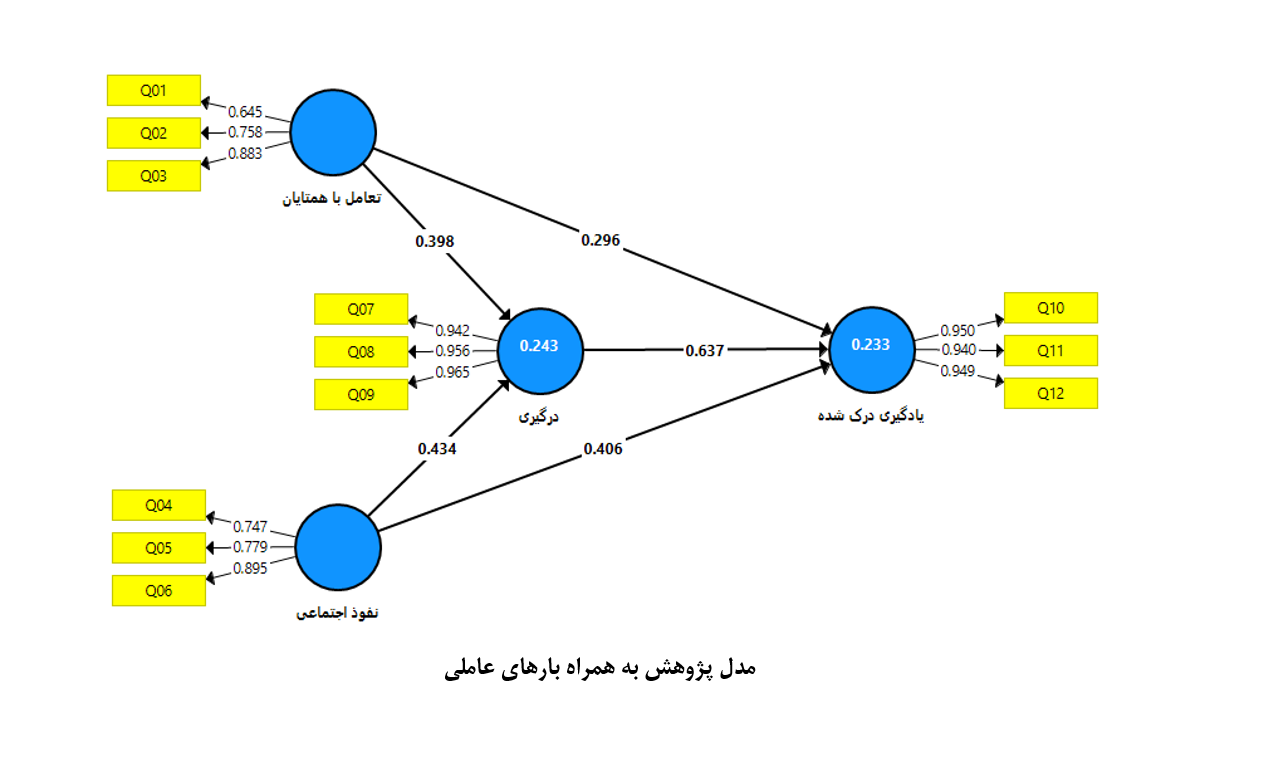The Effect of Peer Interaction and Social Influence on Perceived Learning in Elementary School Students: The Mediating Role of Engagement
Keywords:
تعامل با همتایان, نفوذ اجتماعی, یادگیری درکشده, درگیری تحصیلی, دانشآموزان ابتداییAbstract
This study aims to investigate the effect of peer interaction and social influence on perceived learning among elementary students, considering the mediating role of academic engagement. This applied, descriptive-survey study was conducted on a statistical population comprising all elementary school students in Tonekabon County. Using Cochran’s formula, a sample of 384 students was selected through stratified random sampling. Data collection tools included four standardized questionnaires adapted from Chang and Pen (2023), measuring peer interaction, social influence, engagement, and perceived learning on a 5-point Likert scale. Data were analyzed using Smart PLS and structural equation modeling. The results indicated that both peer interaction and social influence had significant and positive effects on perceived learning. Moreover, academic engagement functioned as a mediating variable, strengthening the relationship between social variables and learning. Path coefficients, t-values, and bootstrap results confirmed the adequacy of the proposed model. The findings highlight the importance of social relationships and student engagement in enhancing perceived learning outcomes. Creating educational environments that foster positive peer interaction and social support can improve students’ academic experiences and achievements.
Downloads
References
La Greca AM, Lopez N. Peer relations, friendships, and romantic relationships: Implications for social anxiety. Journal of Clinical Child & Adolescent Psychology. 2022;49(1):20-35. doi: 10.1207/s15374424jccp3401_5.
Taylor HG, Hoskinson KR, Vrantsidis DM, Minich N, Busch T, Horn T, et al. Quality of Social Relationships With Parents and Peers in Adolescents Born Extremely Preterm. Journal of Developmental & Behavioral Pediatrics. 2023;44(3):e218-e24. doi: 10.1097/dbp.0000000000001165.
Karna W, Stefaniuk I. The Influence of Peer Relationships on the Social Development of Children with Autism Spectrum Disorder. Iranian Journal of Neurodevelopmental Disorders. 2024;2(4):10-8. doi: 10.61838/kman.jndd.2.4.2.
Yang L, Lian LH. Perceive Social Support, Academic Self-Efficacy, and Learning Engagement Among High School Students in China. International Journal of Evaluation and Research in Education (Ijere). 2025;14(1):629. doi: 10.11591/ijere.v14i1.31029.
Moradi S, Mardani F. The Impact of Peer Attachment on Academic Motivation: A Quantitative Analysis. KMAN Counseling & Psychology Nexus. 2023;1(2):4-9. doi: 10.61838/kman.psychnexus.1.2.2.
Fink E, Rosnay Md. Examining Links Between Affective Empathy, Cognitive Empathy, and Peer Relationships at the Transition to School. Social Development. 2023. doi: 10.1111/sode.12685.
Öztop F, Bilač S, Kutuk Y. Improving Empathy and Peer Relationships in Adolescents: A Social Cognition Training Approach. International Journal of Education and Cognitive Sciences. 2024;5(2):23-30. doi: 10.61838/kman.ijeas.5.2.4.
Giovazolias T. The Relationship of Rejection Sensitivity to Depressive Symptoms in Adolescence: The Indirect Effect of Perceived Social Acceptance by Peers. Behavioral Sciences. 2023;14(1):10. doi: 10.3390/bs14010010.
Junaid S, Batool SS, Nazir R, Nayyar A. Relationship Between Peer Pressure and Risk Taking Behavior Among Adolescents: Moderating Role of Family Functioning. Res J Social Affairs. 2025;3(1):121-8. doi: 10.71317/rjsa.003.01.0056.
Kim H, Barry CT. Social intelligence as moderator in the relation between narcissism and aggression in at-risk adolescents. Social Development. 2023;32(2):740-55.
Lim J, Huh Z. Relationship Between Parental Monitoring and Cyberbullying Perpetration Among Male and Female Adolescents: Dual Sequential Mediating Effects of Self-Control and Peer Conformity of Anti-Social Behaviors. Korea University Institute of Educational Research. 2024;91:139-65. doi: 10.24299/kier.2024.372.139.
Xie J, Zhang B, Yao Z, Peng B, Chen H, Juan G. The Relationship Between Social Mobility Belief and Learning Engagement in Adolescents: The Role of Achievement Goal Orientation and Psychological Capital. Frontiers in Psychology. 2022;13. doi: 10.3389/fpsyg.2022.792108.
Zhang F, Peng W. Parental Psychological Control and Children's Learning Engagement and Life Satisfaction: The Moderating Role of Perceived Social Mobility. Psychology in the Schools. 2025;62(5):1422-33. doi: 10.1002/pits.23407.
Suwajo T. Correlation of Learning Engagement and Social Support Affecting the Academic Stress of Thai High School Students. International Journal of Public Health Science (Ijphs). 2024;13(3):1095. doi: 10.11591/ijphs.v13i3.23680.
Zhou X. The Effect of Peer Relationships on College Students’ Behavioral Intentions to Be Physically Active: The Chain-Mediated Role of Social Support and Exercise Self-Efficacy. Plos One. 2025;20(5):e0320845. doi: 10.1371/journal.pone.0320845.
Wang R, Ramel MRM. Social Support and Mathematics Anxiety: The Mediating Role of Learning Engagement. Social Behavior and Personality an International Journal. 2023;51(9):1-9. doi: 10.2224/sbp.12572.
Liwanag MF, Galicia LS. Technological Self-efficacy, Learning Motivation, and Selfdirected Learning of Selected Senior High School Students in a Blended Learning Environment. Technium Social Sciences Journal. 2023;44(1):534-59. doi: 10.47577/tssj.v44i1.8980.
Marsus Nb, Huey LS, Saffari N, Motevalli S. Peer Relationship Difficulties Among Children With Adhd: A Systematic Review. International Journal of Academic Research in Business and Social Sciences. 2022;12(6). doi: 10.6007/ijarbss/v12-i6/13352.
Mobarez M. Social and Emotional Learning in E-Lectures and Its Relation to Academic Achievement, Social Isolation and Engagement in Learning Among Graduate Students. Ijre. 2023;47(3):203-40. doi: 10.36771/ijre.47.3.23-pp203-240.
Slåtten T, Lien G, Batt-Rawden VH, Evenstad SBN, Onshus T. The relationship between students’ psychological capital, social-contextual factors and study-related outcomes – an empirical study from higher education in Norway. International Journal of Quality and Service Sciences. 2023;15(1):17-33. doi: 10.1108/IJQSS-11-2021-0160.

Downloads
Published
Submitted
Revised
Accepted
Issue
Section
License
Copyright (c) 2025 Narges Amir Janati (Author); Samira Pali (Corresponding author)

This work is licensed under a Creative Commons Attribution-NonCommercial 4.0 International License.










